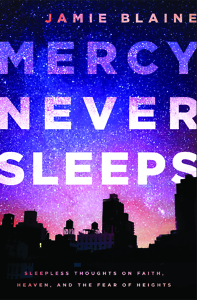Wandering and Wondering Why
Nashville’s Jamie Blaine returns with new adventures in late-night psychiatric counseling
“Here’s the score,” writes Nashville author Jamie Blaine in his new memoir, Mercy Never Sleeps. “I’m working a dead-end dangerous job in the middle of the night for not much money and no place for advancement. My social circle consists of junkies and schizophrenics, inmates, suicidal housewives, cops and ER docs, and convenience store clerks on graveyard shift. In one sense I am alone in the wilderness, the best possible place to meet God. In another I am drifting too far, needing to settle down and get serious about making a life. Am I lost? Or found? I wish I knew.”
 In many ways, Mercy Never Sleeps is a darker sequel to Midnight Jesus, Blaine’s first memoir of his experiences as a psychotherapist working a late-night crisis hotline in a small Southern town. Time has passed since the first book, and this work is getting to him now. He continues to practice Christian compassion with his clients, but he is struggling with his own faith and with regrets for the past, worries about the future, insomnia, and a sudden desire to climb very tall structures in the middle of the night. At work, he describes his role as “equal parts missionary, daredevil, detective, magician, tracker, and theologian. You wear a lot of hats once the sun goes down. You wing it and do your best.” Mostly he just seems really, really tired.
In many ways, Mercy Never Sleeps is a darker sequel to Midnight Jesus, Blaine’s first memoir of his experiences as a psychotherapist working a late-night crisis hotline in a small Southern town. Time has passed since the first book, and this work is getting to him now. He continues to practice Christian compassion with his clients, but he is struggling with his own faith and with regrets for the past, worries about the future, insomnia, and a sudden desire to climb very tall structures in the middle of the night. At work, he describes his role as “equal parts missionary, daredevil, detective, magician, tracker, and theologian. You wear a lot of hats once the sun goes down. You wing it and do your best.” Mostly he just seems really, really tired.
The narrative swings between the past and the present, highlighting the way Blaine’s approach to his impossible job has changed over the years. He realizes now how much he has in common with his clients: “When I started working in psych wards, I was still naïve and judgmental enough to believe that addicts and mentally struggling people were somehow different. Soon enough the truth hit home: the people I was seeing weren’t any less spiritual or smart or privileged than me. Nothing but grace and circumstance lay in the thin spaces between us.”
Blaine visits his clients six days a week, 6 p.m. to 6 a.m., whenever and wherever their desperate needs arise—city and county jail cells, rooftops and the sides of bridges, mental-health facilities, emergency rooms, and private homes. Even when he’s not with a client, it’s pointless to try to sleep—the phone will eventually ring and call him out for the next potentially dire and heartbreaking situation. “I stay awake most every night ‘til dawn,” he writes, “loitering in airports and all-night grocery stores, driving aimlessly, revisiting the old ghosts of town.” On these midnight rambles, he climbs things: radio towers, water towers, fire towers, fire escapes, football stadiums, the second tallest building in town,” because, he writes, “elevation brings perspective. If I climb high enough and sit still long enough, then I don’t think so many scrambled thoughts. When it’s late and still and the lights of the city are dim, that’s often when God slips out from the shadows and draws near.”
Blaine’s encounters with clients bring other revelations. They muse on the nature of heaven and the meaning of life, how to find Jesus (or how to signal him to come find you), and whether God could possibly resemble a member of ZZ Top and drive a black Monte Carlo. But mostly they talk about the ways life has bruised and battered them physically and emotionally. Blaine listens and relates. The honey bun he shares with a suicidal inmate is no less a sacrament for being consumed behind bars. The knife he gently removes from a mentally ill client is no less a deadly weapon for being wielded by someone who can’t comprehend the consequences of his actions.
 If the story struggles to establish forward momentum at times and seems altogether more dreamlike and fragmented than Midnight Jesus, its episodic pace mirrors the author’s own state as he descends into a place of too little self-care, too many sleeping pills and energy drinks, and much too much pressure. “My story is broken too,” he admits.
If the story struggles to establish forward momentum at times and seems altogether more dreamlike and fragmented than Midnight Jesus, its episodic pace mirrors the author’s own state as he descends into a place of too little self-care, too many sleeping pills and energy drinks, and much too much pressure. “My story is broken too,” he admits.
Nevertheless, Mercy Never Sleeps does not lack Blaine’s trademark humor. This is the man who allocates himself “thirteen curse words a year, just to stay grounded and meek,” one who takes his client’s place as a Salvation Army bell-ringer so she can go straight to rehab. Quick with the self-deprecating zingers, Blaine often uses humor to defuse tense situations, but he remains grounded in his faith even as he questions the details. “We see through a dark glass in this life,” he expounds. “[A]ll we have is broken bits and scattered memories, keepsakes and compasses, souvenirs of a life wandering and wondering why.”

A graduate of Auburn University, Tina Chambers has worked as a technical editor at an engineering firm and as an editorial assistant at Peachtree Publishers, where she worked on books by Erskine Caldwell, Will Campbell, and Ferrol Sams, to name a few. She lives in Chattanooga.


